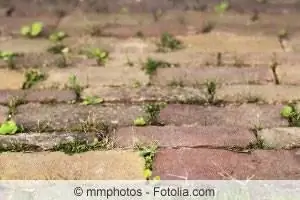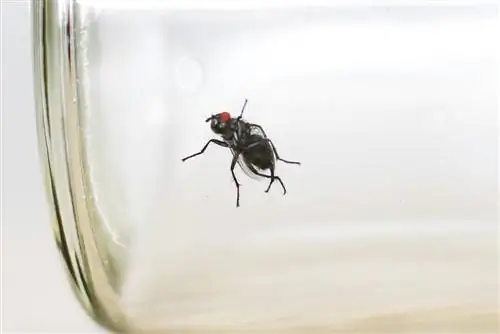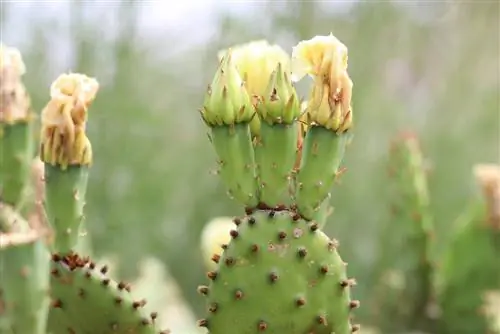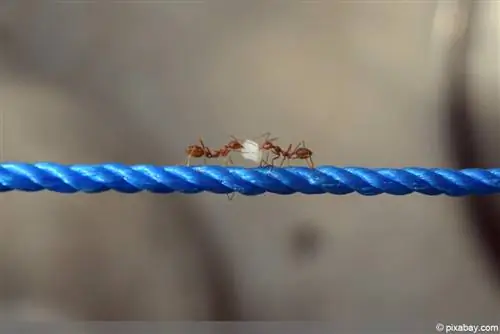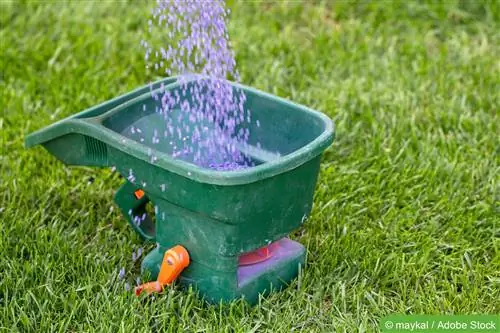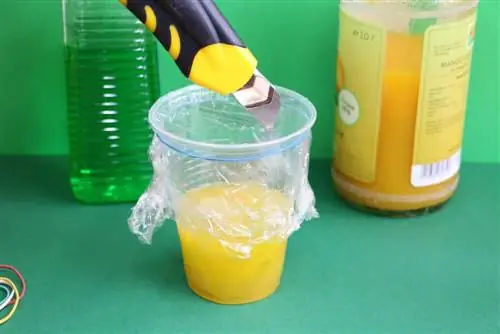- Author admin caroline@plants-knowledge.com.
- Public 2023-12-17 03:39.
- Last modified 2025-01-24 12:45.
You don't necessarily have to "make" weed killers yourself; in fact, you should definitely not do that. The use of effective “home remedies” against weeds in particular is at least a use of banned pesticides and entails high fines, if not even environmental criminal law is affected. The best home remedy for weeds is your hand, with the right tools in it.
Why home remedies quickly become pesticides
There are many home remedies you can use to destroy a plant. Vinegar and s alt kill plants, acetic acid and hydrochloric acid kill plants even more. Probably half the contents of your refrigerator or cleaning cupboard are capable of killing plants if you pour or pile it over the plant. Which doesn't mean you should or can do that:
If a home remedy is used to destroy a plant, it is no longer a home remedy (for colds, spots, warts), but a plant protection product - just as the bread knife in the hereditary aunt is no longer a kitchen tool, but a murder weapon. The Plant Protection Act of February 6, 2012 has responded to a we alth of new findings, research results, demonstrable undesirable developments, changes in social views, etc., which suggest that the “chemical madness in nature” should be urgently limited - to protect everyone involved. the citizens (consumers), nature (environment), the trading companies who do not like to sell harmful things and, last but not least, the farmers, who are largely more than critical of the development of their profession. That is why this Plant Protection Act (together with the approval regulation VO EC No. 1107/2009) regulates the use of plant protection products in commercial environments and in home and allotment gardens, both of which are increasingly restrictive because the “signs of the times” demand this.
Plant protection products in home and allotment gardens are, in case of doubt, much more likely to be viewed by the legislature as potentially dangerous (because they are applied in the home environment) than plant protection products in commercial plant production. In commercial use, the application can also be controlled much more strictly (and is also controlled more strictly), while just a few years ago (uninformed) home and allotment gardeners spilled a lot more pesticides in their gardens than were used commercially (hopefully this is the result next survey better values). Therefore, fewer plant protection products with fewer active ingredients are permitted in home and allotment gardens, which are carefully tested before approval and are only approved in precisely defined quantities and for precisely specific plants. That is why the use of “domestic remedies” as (banned because they are not approved) plant protection products is no longer seen as a “small horticultural aberration” but is punished with hefty fines.
The benefits of home remedies
There are other “home remedies” in garden centers or other supply sources in the hobby gardening industry, quite a few in fact; home gardeners are known as willing buyers for all possible and impossible innovations. Therefore, these home remedies and household appliances should be checked with a clear head and a cool mind to see whether they really help against weeds (and if so, whether they save any time compared to weeding):
-
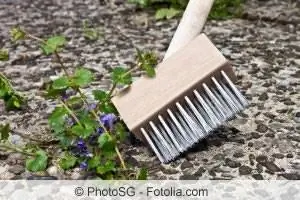
remove weeds The weed puller or chipper, the joint scraper, the weed goblin and whatever else is on offer must fit the weeds
- And they work, some design pieces can't scare a blade of grass
- Hot water is undoubtedly a home remedy, but not necessarily a convenient one
- It takes a lot of time until you bring the portion of water to the boil to destroy a plant, and it's not in vain either
- You can spend hours running from the kitchen to the pavement with boiling water - or minutes weeding
- Weed burners cost a lot, whether purchased or rented, the most effective (infrared) devices cost at least three-digit sums
- All weed burners require strict safety precautions during operation and ventilation when storing
- The number of beneficial insects that are torched each time has not yet been statistically recorded, but there are said to be some
- In addition, slash-and-burn cultivation tends to result in increased new growth if the heat applied to the plant is incorrectly dosed
- Correct dosage is actually only possible in commercial use on large areas, not with the small hand-held device in private gardens
- The use of steam jets or high-pressure cleaners against weeds is also recommended
- They spray weeds out of the joints with a powerful jet, and dirt, and the joint filling
- Even “the most effective method for any weeds in the garden, pulling them out by hand,” should not be used uncritically
- Some weeds sprout much faster if you just pull out a piece of the root
- Horizontal runners are encouraged to grow, they now appear everywhere in the garden
- Incorrectly used tools can have the same effect, cutting the root in the middle is often also an invitation to growth
- We already had s alt, vinegar and the like, and the application of any biotics (animal beneficial insects or pests) that are advertised on the Internet goes in the same direction
- They are not necessarily native and can do all kinds of harm to our environment
- You shouldn't uncritically invite unknown mushrooms into the garden, as they may be followed by unknown pests
- One use of pesticides (really chemicals) doesn't matter, then at least there's peace and quiet?
- Yes, do something, it also damages other plants and the garden soil, the whole garden becomes even more out of balance
- Brings more weeds in the long term, not less, and maybe a little allergy or conjunctivitis
Tips are in, and since journalists are no longer in, giving tips is increasingly being left to people who don't have to answer to an editorial team. Some things are recommended for weed control that common sense warns against implementing - and unfortunately this does not prevent you from using common sense when dealing with weeds in the garden.
And which home remedy really helps against weeds
No spectacular miracle cures, but you can work successfully against weeds with “hand and head”:
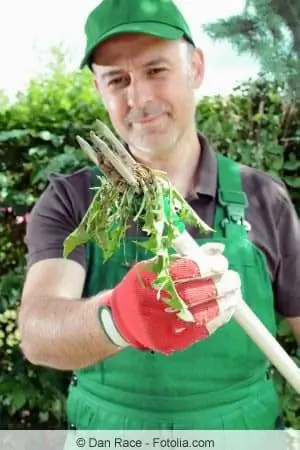
Weeds can be removed by normal manual work, but easily only with the right method. So first identify weeds and look at the roots, then collect information as to whether this weed needs to be removed with the roots and then consider which method and tool is best to use to deal with the weeds. In the other articles on “Weeds in the Garden” many methods and tools are presented with which you can cut plants above the ground or remove them from the ground, for some this works better in/from rain-soaked, soft soil, for some it works better in /from extremely hard, dry ground. If larger, perhaps fallow areas need to be cleared of weeds, the gentlest way to do this for the garden is to use a rather simple and inexpensive method: the weeds grow thick and are covered with biomass for at least six months, i.e. mulched. The plants that are to be killed are immediately processed into humus. And you avoid heavy equipment from the hardware store “falling over your garden floor” and causing a lot of destruction. However, the prerequisite is that your garden soil or fallow land is living soil. If the soil organisms have to migrate again, it can take longer (more on this in the article “Removing weeds over large areas”).
Preventing weeds
A naturally managed garden will eventually find its balance. Then all the plants compete with each other, and no plants even have the chance to spread excessively. Because there is hardly any bare soil in such a garden, ground cover or herbs grow between ornamental plants and vegetables and under trees, or there is mulching.
Redefining “un-” herb
Whether a wild herb is a weed is up to your definition. Many wild herbs have many positive properties: They can enrich the menu with their leaves, seeds and roots and can be used in the garden as a plant tonic, the flowers not only decorate cakes, tea made from the herb heals or colors Easter eggs. These were just a few examples; our ancestors had many ideas and extensive knowledge about the plant world in which they lived. And perhaps we should stop dismissing useful knowledge as old-fashioned and instead buy nutrient-depleted industrial food whose excessive sugar content makes us sick.
Conclusion
Lots of home remedies are recommended to kill weeds, but their use should be checked very carefully. Destroying weeds by hand (plus suitable tools/equipment) is still the best home remedy, together with sensible weed prevention - if the weeds are to go at all.

